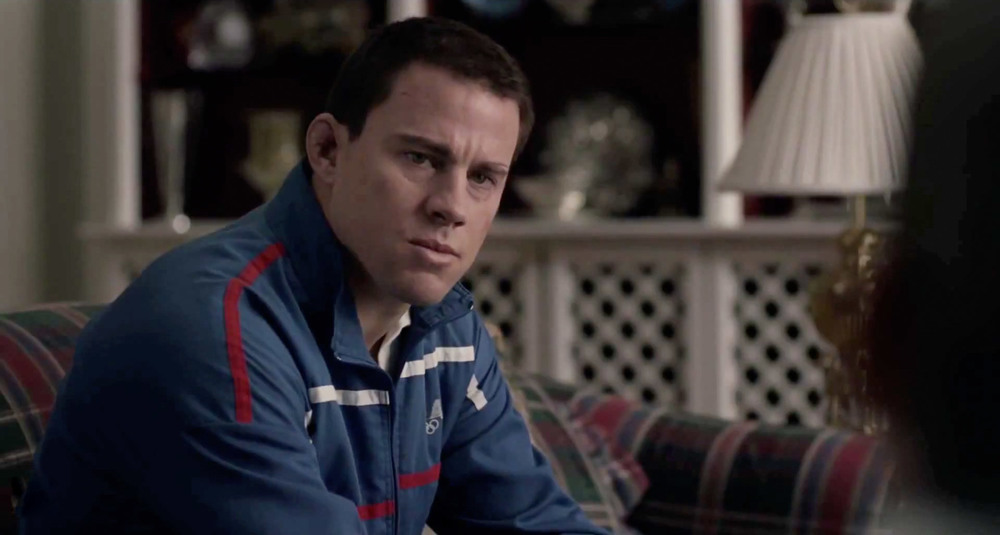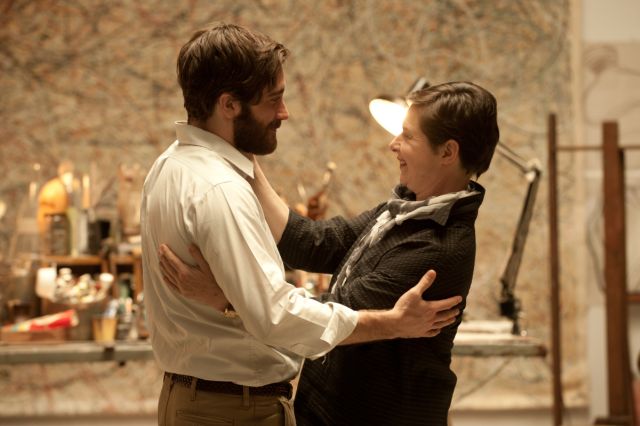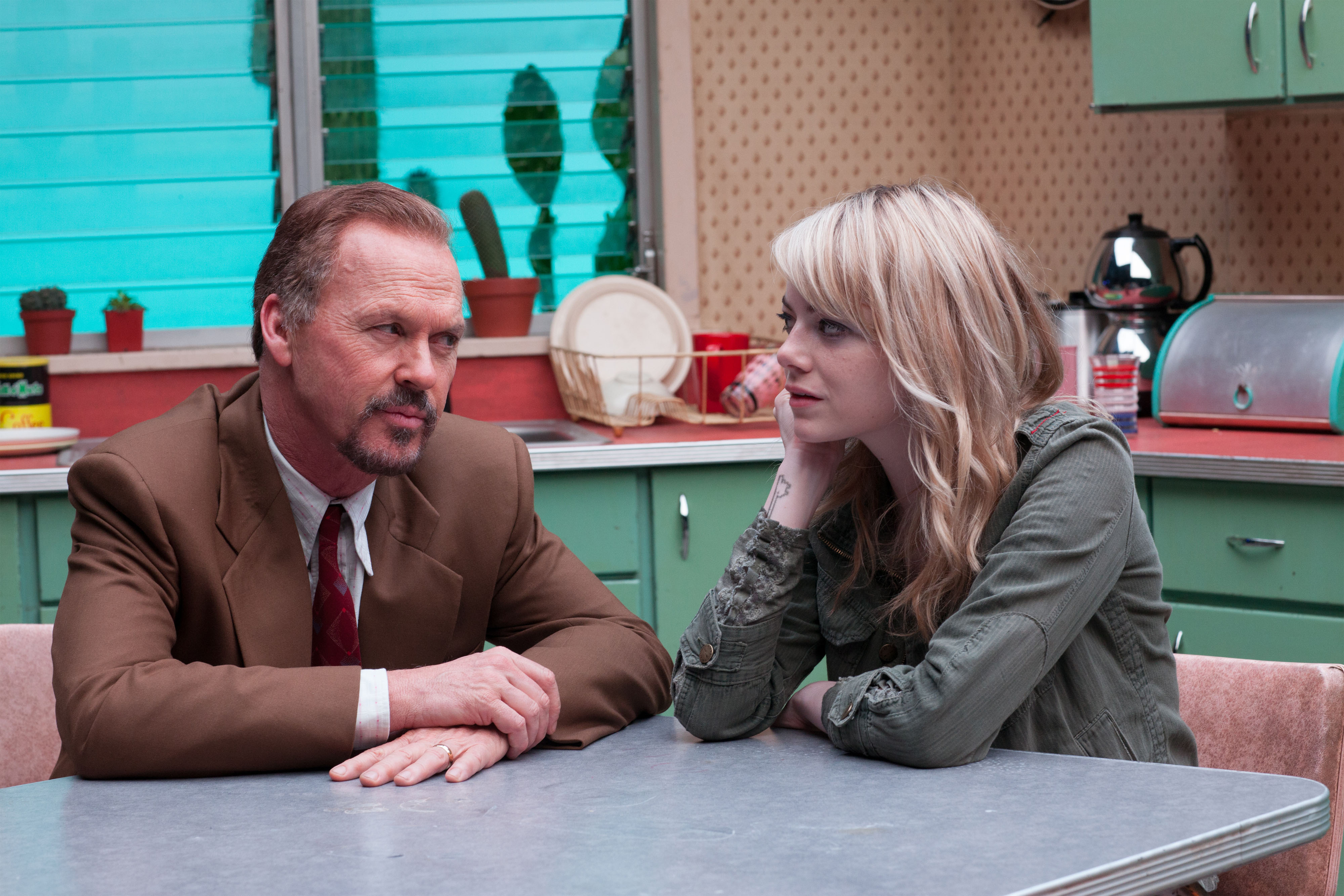Woods and forests were given a fresh impetus as a psychic terrain for the cinema by Lothlórien, Fangorn, and the other sylvan spaces so ethereally or threateningly rendered in The Lord of the Rings films and, to a lesser extent, by the Mirkwood of the second Hobbit movie. All distorted black boles, labyrinths of tangled branches, knobbly roots, and conically sun-strafed clearings, they were movie woods to rival the great Gothic forest of Fritz Lang’s Die Nibelungen: Siegfried (1924) and the magical Athenian wood Warner Bros.

Steve Carell makes the move from the light comedy of the American workplace to the dark side of that country as delusional blue-blood John Eleuthère du Pont in a transformative and creepy performance that borders on the grotesque.
Foxcatcher is based on a shocking true story set in the wrestling world. Though some of the events occurred in the 1990s and over a longer time period, director Bennett Miller sets his film towards the end of the 1980s. Miller’s previous feature, Moneyball, was also set in the sports world but instead of focusing on the players he chose to look at the maths behind the game. In a similar way he subverts the long arduous road-to-glory sports story by exploring the inner lives of Olympic gold medal-winning wrestler, Mark Schultz (Channing Tatum, pictured below right), his brother and coach, Dave (Mark Ruffalo), and the aforementioned mercurial man who supported their training sessions in the grounds of his grand home in preparation for the Seoul 1988 Olympic Games.
Miller’s precise, cold and detached composition alongside Greig Fraser’s expert cinematography, echo the isolation, paranoia and clinical view of du Pont’s ever-watchful eye and deteriorating mind-set. A sinister atmosphere is established from the outset and the dread is palpable.
 Carell mimics the meticulous pronunciation of a politician delivering a meaningless speech, his pregnant pauses bristling against the nape of your neck like a slithering snake. A particularly memorable scene which sees du Pont offering Schultz cocaine while travelling in his private helicopter is hypnotic. Du Pont gleefully exhales a list of the things he collects, furthering the sense of pride in ownership that has been instilled in him by his mother (the excellent Vanessa Redgrave) and it's terrifying. Miller makes it clear from the start that no good will come from the teaming up of these proud patriots, but here he turns du Pont into something quite monstrous.
Carell mimics the meticulous pronunciation of a politician delivering a meaningless speech, his pregnant pauses bristling against the nape of your neck like a slithering snake. A particularly memorable scene which sees du Pont offering Schultz cocaine while travelling in his private helicopter is hypnotic. Du Pont gleefully exhales a list of the things he collects, furthering the sense of pride in ownership that has been instilled in him by his mother (the excellent Vanessa Redgrave) and it's terrifying. Miller makes it clear from the start that no good will come from the teaming up of these proud patriots, but here he turns du Pont into something quite monstrous.
If du Pont plays the politician it's Mark Schultz who takes on the role of keen supporter. At first he is put under the spell of great promises, then he engages in amicable relations before finally he begins to notice the cracks in the veneer as the perennial smile fades from the face of his patron. Tatum refuses to play Schultz as a knucklehead. He was, in fact, greatly aided by the real-life wrestler and it shows not only in his stance and mannerisms but the way in which he reaches into the psyche of a professional athlete.
Miller’s powerful and surefooted psychological drama possesses an intensity and haunting elegance which demands you bear witness to chilling and bleak sights.
Overleaf: watch the trailer for Foxcatcher

The octogenarian Frederick Wiseman is a cult documentary film maker, with his own idiosyncratic and recognisable idiom. He has both vast experience and extraordinary independence. Characteristically, he makes long, prize-winning, fly-on-the-wall inside-the-institution films: reportorial, non-judgemental, loosely narrative, and wide in subject – from a hospital for the criminally insane, to a high school, the largest university in California (Berkeley), or the Paris Opera Ballet.

French actress Marie Rivière had a specially close relationship with director Eric Rohmer. After seeing his work for the first time in the early 1970s, Rivière expressed her admiration in a letter, which led to a succession of parts and culminated with her appearing as heroine Delphine in Rohmer’s 1986 The Green Ray (Le rayon vert): the part was in some way centred on the experiences of the actress, who was allowed to develop the story through almost total improvisation.

Filmgoers will either find Denis Villeneuve's latest art-house thriller to be a tantalising head trip or so much celluloid posturing, but there's no denying its contribution to the rise and rise of leading man, Jake Gyllenhaal. Racing up the outside track as a potential Oscar nominee for Nightcrawler even as he is making a (splendid) Broadway debut in the Nick Payne play Constellations, Gyllenhaal here gets to impress twice over and for a simple reason: Javier Gullon's script casts the hirsute star in two different, teasingly complementary parts.
Thoughts of Jeremy Irons's career-best work in Dead Ringers come to mind, or the sort of conceit one might expect from David Lynch, whose shimmering reality-vs-illusion landscape comes to mind here. And while the surface narrative is apparent enough, its larger meanings remain up for grabs, and one can only begin to imagine the PhD students who are going to be probing every frame for its fullest meaning for some years to come.
 For now, let me just say that I admired Enemy more than I warmed to it, and that there are numerous other movies whose deeper resonances seem to me more immediately worth mining (Lynch's Mulholland Drive to name but one). But whether you tune out to this movie or (as some are said to have been) are freaked out by it, there's no denying the absolute command of Gyllenhaal, who over time has learned to put his puppyish appeal to one side in favour of a more forceful, declarative style of performance that should serve him in good stead as he gets older and less obviously "cute". Think of this as part of Gyllenhaal's thespian insurance plan for an ever more varied screen future.
For now, let me just say that I admired Enemy more than I warmed to it, and that there are numerous other movies whose deeper resonances seem to me more immediately worth mining (Lynch's Mulholland Drive to name but one). But whether you tune out to this movie or (as some are said to have been) are freaked out by it, there's no denying the absolute command of Gyllenhaal, who over time has learned to put his puppyish appeal to one side in favour of a more forceful, declarative style of performance that should serve him in good stead as he gets older and less obviously "cute". Think of this as part of Gyllenhaal's thespian insurance plan for an ever more varied screen future.
Roughly half the film casts Gyllenhaal as Adam Bell (pictured above with Isabella Rossellini, who plays his mother), a faintly nerdy college professor who seems to spend his time when not lecturing having sex with his girlfriend (Melanie Laurent), and who can blame him for that? At least, that much is true until Adam rents a film one evening in which he happens to espy a bit-part actor, Daniel aka Anthony, who looks uncannily like himself, bodily scar and all. As purposeful – almost ominously so – as Adam is indrawn, Anthony responds to Adam's obsessional interest in him by commandeering significant (for which, read sexual) aspects of his doppelganger's life, the stakes escalating as the subconscious and the supernatural begin to take hold as well.
What follows tells perhaps the battle of a battered psyche or suggests a veiled political parable about societal misrule as it is allowed to infiltrate even the most ordinary lives. Or maybe the film is just about giving its leading actor the opportunity to push in two separate if ever-intersecting directions. Some won't care whereas others will be rapt. You could do worse than ponder Enemy's Cronenbergian affinities (yes, him too) and allow respect for Gyllenhaal to override the more self-conscious meanderings of what looks set to be this new year's murkiest film.
Watch the trailer for Enemy overleaf

It’s Turing versus Hawking, Cumberbatch v Redmayne, computer science v astrophysics, tragedy v the triumph of love. Ever since The Imitation Game and The Theory of Everything appeared at the Toronto Film Festival last year, the head to head has been inevitable, leading all the way to the Oscars.

Directed by Alejandro González Iñárritu,Birdman is the story of a fading star’s search for professional rehabilitation and personal redemption that perches adroitly between dark humour and darker despair and injects a familiar story of mid-life crisis with fresh vitality and emotion thanks to vivid flights of an intensely cinematic fancy.
Michael Keaton, a leading man in light comedies before rising to the big leagues by playing Batman in the Tim Burton original and first sequel, has been cast for maximum meta-value as Riggan Thomson, an actor who found fame by playing Birdman, the superhero of an eponymous film franchise. Riggan is now seeking to resurrect both his career and artistic credibility by writing, directing, and starring in a stage version of Raymond Carver’s What We Talk About When We Talk About Love on Broadway.
As well as putting everything on the line creatively, Riggan has to manage personal and professional complications arising from clashes with his co-star, an intense, Sean Penn-like Method devoté played by Edward Norton (giving rise to a hilarious Fight Club nod in another meta-joke), an unwise affair with the show’s needy ingénue (Andrea Riseborough), and the appearance of his estranged, semi-rehabbed daughter (Emma Stone pictured, below right, like Keaton giving a career-best performance). The backstage saga is imbued with understanding of and affection for actors and their combination of wild egomania and profound insecurity.
 But primarily Riggan has to battle himself, or the aspect personified by his filmic alter ego, who periodically turns up to suggest he’s going to make a fool of himself with all this highbrow stuff and should return to the safety of the mainstream. And Birdman also represents the self-absorbed, insensitive, career-driven side of Riggan that has undermined his marriage and his relationship with his daughter. Ironically, it is this persona that is dragging him down, preventing him from breaking free from old self-destructive patterns and soaring to new heights.
But primarily Riggan has to battle himself, or the aspect personified by his filmic alter ego, who periodically turns up to suggest he’s going to make a fool of himself with all this highbrow stuff and should return to the safety of the mainstream. And Birdman also represents the self-absorbed, insensitive, career-driven side of Riggan that has undermined his marriage and his relationship with his daughter. Ironically, it is this persona that is dragging him down, preventing him from breaking free from old self-destructive patterns and soaring to new heights.
Even more than the Birdman, another entity hovers over the film – the spirit of Robert Altman. Like Altman (who directed Short Cuts, constructed from inter-leaved Carver short stories), Iñárritu has a fondness for creating films with multi-stranded narratives. And remember the epic, masterful tracking shot that kicked off The Player, Altman’s dark satire of Hollywood? All of Iñárritu’s dark satire of Hollywood looks like one epic, masterful tracking shot as the camera swoops and glides backstage, onstage, and outside the theatre to Times Square and the surrounding streets.
Birdman also evokes Bernard Rose’s lesser-known but wonderful Ivansxtc, in which a Hollywood player in extremis reconsiders his priorities to the strains of Wagner, as Riggan does to the strains of Mahler, when not engaged in conflicts accompanied by a driving solo jazz drummer (you wait years for a film with a solo jazz drum score and then two – this and Whiplash – come along at once).
A moving, exhilarating ride into the depths of the soul and up through the empyrean of the imagination
However – and I say this with trepidation, given the excoriating attack on critics Riggan delivers to Lindsay Duncan’s pinch-faced bluestocking of a New York Times reviewer, a creature so friendless and misanthropic she is always pictured scribbling alone at a bar – the ending is problematic, at least for anyone with a low tolerance for magical realism. There are elements of magic realism right from the start (for example, Riggan’s ability to move objects telekinetically), but it’s entirely possible his superhuman powers exist solely in his mind. But then in the final scene we are asked, I feel, to accept their objective reality, though I know others who think Riggan’s final action is only figuratively rather than literally true.
As well, Iñárritu lets several important plot dynamics just drop. I’m not saying they need to be tied up with a neat bow, but we shouldn’t feel he’s forgotten about the characters and it made me wonder if he likes multi-stranded narratives because he doesn’t really do wrapping up subplots. But for most of the time, Birdman is a moving, exhilarating ride into the depths of the soul and up through the empyrean of the imagination.
Overleaf: watch the trailer for Birdman

This year's award-courting survival picture (after 2013's All Is Lost, and 2012's Life of Pi) is based on the genuinely remarkable story of Olympian Louis Zamperini. It's a tale of heroic resilience in the face of an onslaught of adversity, helmed by someone who, in a very different way, is pretty unstoppable herself – Dame Angelina Jolie.

I wish Mel Brooks had directed this, but instead we've got the sort of stodgy techno-epic that has become all too common from the auteur-ial hand of Ridley Scott. Ridley's 150-minute rehashing of the Biblical story of Moses is often a feast for the eyes (especially in 3D), with its vast Egyptian panoramas and stunningly mounted action sequences, but the characters are largely cardboard, the dialogue is dire and a lot of very good actors are given nothing of any consequence to do. Did somebody mention Kingdom of Heaven?


